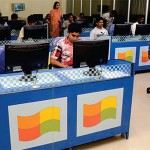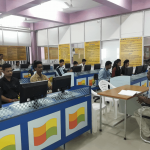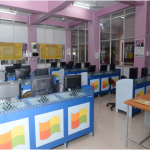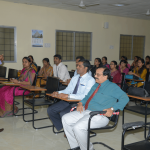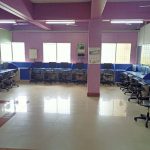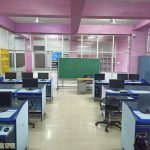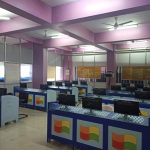Computer Science And Engineering
The Department of Computer Science and engineering was established in 2009 with an intake of 60. It has been increased to 120 in the year of 2017-18 and further to 180 in the year 2022-23. The National Board Accreditation, AICTE-New Delhi, has provisionally accredited the BE program from Academic year 2016-17 to 2018-19. Further, the department has extended accreditation from Academic year 2019-20 to -2021-22. The Department has well qualified, experienced and dedicated faculty members, who are fully committed to teaching and research. The department provides high-quality technical education to meet the challenges of industry and social needs. It provides all-around personality development with responsibility, emphasizing quality, standards, research, and innovation for students and faculties. It provides a rigorous and Interdisciplinary training and Cutting-Edge technologies for the enrichment of the students. The scope of department lies in the areas like Programming, Software Engineering, Database Design and Maintenance, Web Services, IOT, Cloud Computing, and Big-Data, etc. Our aim is to provide quality education to the students and impart programming excellence in them. Apart from making the students as good technocrats, individual attention is also given to make the student a good citizen and also to serve the industry and society beneficially.
PE02 : To inculcate ability in creativity & design of computer support systems and impart knowledge and skills for analyze, design, test and implement various software applications
PE03 : To exhibit leadership capability, triggering social and economical commitment and inculcate community services and protect environment.
PS02:Foundation of Computer System: the ability to interpret the fundamental concepts and methodology of computer systems. Students can understand the functionality of hardware and software aspects of computer systems.
PS03:Foundations of Software development: the ability to grasp the software development lifecycle and methodologies of software systems. Possess competent skills and knowledge of software design process. Familiarity and practical proficiency with a broad area of programming concepts and provide new ideas and innovations towards research
Innovations by the faculty
Instructional Materials
View Event Report 2023-24 View Event Report 2022-23 View Event Report 2021-22 View Event Report 2020-21 View Event Report 2019-20 View Event Report 2018-19 View Event Report 2017-18 View Event Report 2016-17 View Event Report 2015-16
1. Identify a issue and derive problem related to society, environment, economics, energy and technology
2. Formulate and Analyze the problem and determine the scope of the solution chosen
3. Determine , dissect, and estimate the parameters required in the solution.
4. Evaluate the solution by considering the standard data / Objective function and by using appropriate performance metrics.
5. Compile the report and take part in present / publishing the finding in a reputed conference / publications
6. Attempt to obtain ownership of the solution / product developed.
• Foundation knowledge in database concepts, technology and practice to groom students into well-informed database application developers.
• Strong practice in SQL programming through a variety of database problems.
• Develop database applications using front-end tools and back-end DBMS.
• Demonstrate operation of the network and its management commands
• Simulate and demonstrate the performance of GSM and CDMA
• Implement data link layer and transport layer protocols.
• Develop and test Program using ARM7TDMI/LPC2148
• Conduct the experiments on an ARM7TDMI/LPC2148 evaluation board using evaluation version of Embedded ‘C’ & Keil Uvision-4 tool/compiler.
• Design and implement various algorithms in JAVA
• Employ various design strategies for problem solving.
• Measure and compare the performance of different algorithms.
View Newsletter 2020-21 View Newsletter 2019-20
View Newsletter 2018-19
View Newsletter 2017-18
View Newsletter 2016-17
View Newsletter 2015-16
View Newsletter 2014-15
Quality Policy
- Empower the stakeholders in the process of continuous improvement of the department
- Inculcate the importance of interdisciplinary research
- Progressively updating the practical implementations towards entrepreneurship
Vision
The vision of the Computer Science and engineering department is to provide excellence knowledge and enrich the problem solving skills of the students in the field of CSE with a focus to prepare the students for industry need, carry out research, recognized as innovative leader, responsible citizen and improve the environmentMission
- Prepare the students with strong fundamental concepts, analytical capability, programming and problem solving skills.
- Create an ambience of education through faculty training, self learning, sound academic practices and research endeavors.
- Provide opportunities to promote organizational and leadership skills in students through various extra- curricular and co-curricular events
- To make the students as for as possible industry ready to enhance their employability in the industries.
- To improve department industry collaboration through internship programme and interaction with professional society through seminar/workshops.
- Imbibe social awareness and responsibility in students to serve the society and protect environment
Programme Educational Objectives
PEO1 : To provide the imperatives knowledge of science and engineering concepts fundamental for a computer professional and equip the proficiency of mathematical foundations and algorithmic principles for competent problem solving ability.PE02 : To inculcate ability in creativity & design of computer support systems and impart knowledge and skills for analyze, design, test and implement various software applications
PE03 : To exhibit leadership capability, triggering social and economical commitment and inculcate community services and protect environment.
PSO’s
PS01:Foundation of mathematical concepts: To use mathematical methodologies to crack problem using suitable mathematical analysis, data structure and suitable algorithm.PS02:Foundation of Computer System: the ability to interpret the fundamental concepts and methodology of computer systems. Students can understand the functionality of hardware and software aspects of computer systems.
PS03:Foundations of Software development: the ability to grasp the software development lifecycle and methodologies of software systems. Possess competent skills and knowledge of software design process. Familiarity and practical proficiency with a broad area of programming concepts and provide new ideas and innovations towards research
Department Profile
The Department of Computer Science and Engineering was established in the year 2009. The department is equipped with computer laboratories consisting of high end computing systems, digital and analog equipments, High end Server Class Systems including IBM Open Power Server. These systems are connected to LAN which is networked to Institute campus wide (WAN) with access of INTERNET (Access available for 24×7 from both Wired and WiFi connectivity) from each departmental computers. There are several common facilities such as Laser Printers, Color Scanners, LCD DLP Projectors, Wireless Devices, Network Switches, Peripheral accessories, Equipment based on digital hardware/firmware, besides licensed software are available as general resources for the usage of students and faculty members of the department. The department has got funding for research from international universities and AICTE. The department has highly qualified and experienced faculty members including young dynamic fanatical teachers. It has members who have won ‘Best Teacher’ awards, ‘Best Researcher’ awards and few of them are listed in Marquis Who’s Who in Science and Engineering.Departmental Activities
- Department association has been formed with the logo “CODE” (computer organization for developing Engineers)
- Expert talk from MRO-Tech Bangalore.
- seminar on cyber crime and malware from MCAFEE BANGALORE 1) skills and tips in programming domain from EKALAVAYA UNIVERSYS, BANGALORE 2) object thinking and programming from INFOSYS BANGALORE 3) Cyber crime and ethical hacking from DF &T, BANGALORE
Instructional Materials
CSE – SAR
CSE SARCSE – MOU
Duhok Mit Square Gmat Infosys Limited University of Aberdeen Shreekrish Innovations C Innovation Creation SWAYAM NPTEL Local Chapter Vaishnavi Systems and Engineering Technofly Prinston Smart Engineers Letter of Association Tequed labsCSE – ICT Academy
Year 2024 Year 2023 Year 2022 Year 2021 Year 2020 Year 2019 Women Empowerment Program Cloud Computing ProgramCSE – Centre for Excellent
DXC Technology CENTRE FOR Women Empowerment Honeywell Center for ExcellentCSE – Value Added Courses
SWAYAM NPTEL Spoken Tutorial -IIT BombayCSE – Faculty Achievement
Faculty Awards and Achievements Faculty Publication Details Faculty Patent DetailsCSE – Faculty Book and Book Chapter
Number of books and chaptersCSE – Event Conduction
View Event Report 2024-25View Event Report 2023-24 View Event Report 2022-23 View Event Report 2021-22 View Event Report 2020-21 View Event Report 2019-20 View Event Report 2018-19 View Event Report 2017-18 View Event Report 2016-17 View Event Report 2015-16
CSE – Industrial Visit
Be-Practical Tech Solutions(5th A sem) Be-Practical Tech Solutions(5th sem B) Industrial Visit ISRO 2022 Shivanasamudra Solar Plant Division MandyaCSE – Infrastructure
Department has very good infrastructure comprising of separate space for different laboratories. Some of the Labs are Computer Programming Lab, Data structure Lab, Database management lab, Analysis and Design of Algorithm Lab, , and application software’s which are included are ORACLE 10G, Visual studio
Laboratory Facilities
The students should be able to:1. Identify a issue and derive problem related to society, environment, economics, energy and technology
2. Formulate and Analyze the problem and determine the scope of the solution chosen
3. Determine , dissect, and estimate the parameters required in the solution.
4. Evaluate the solution by considering the standard data / Objective function and by using appropriate performance metrics.
5. Compile the report and take part in present / publishing the finding in a reputed conference / publications
6. Attempt to obtain ownership of the solution / product developed.
DBMS Laboratory with Mini Project
This course (18CSL58) will enable students to:• Foundation knowledge in database concepts, technology and practice to groom students into well-informed database application developers.
• Strong practice in SQL programming through a variety of database problems.
• Develop database applications using front-end tools and back-end DBMS.
Computer Network Laboratory
This course (18CSL57) will enable students to:• Demonstrate operation of the network and its management commands
• Simulate and demonstrate the performance of GSM and CDMA
• Implement data link layer and transport layer protocols.
Microcontroller and Embedded Systems Laboratory
This course (18CSL48) will enable students to :• Develop and test Program using ARM7TDMI/LPC2148
• Conduct the experiments on an ARM7TDMI/LPC2148 evaluation board using evaluation version of Embedded ‘C’ & Keil Uvision-4 tool/compiler.
Design and Analysis of Algorithms Laboratory
This course (18CSL47) will enable students to :• Design and implement various algorithms in JAVA
• Employ various design strategies for problem solving.
• Measure and compare the performance of different algorithms.
Students Forum of the Department” -CSE department
Department has got its students association by name “RACE”, inaugurated in the year 2015. Since then several technical talks, Seminar, Workshop and conferences have been arranged for enhancing the students’ practical skills. The association also encourages students to participate in “Smart India Hackathon” and various extra co curricular activities.
Lab Gallery
CSE – Internship
View Internship 2023-24 View Internship 2022-23 View Internship 2021-22 View Internship 2020-21 View Internship 2019-20 View Internship 2018-19 View Internship 2017-18 View Internship 2016-17CSE – Newsletter
View Newsletter 2021-22View Newsletter 2020-21 View Newsletter 2019-20
View Newsletter 2018-19
View Newsletter 2017-18
View Newsletter 2016-17
View Newsletter 2015-16
View Newsletter 2014-15










